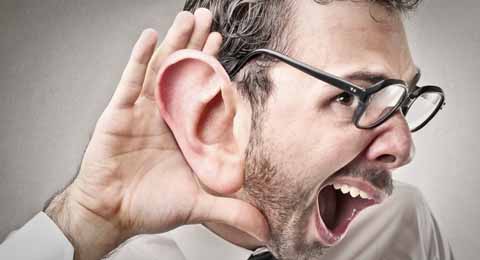Aging and being around a lot of loud noise can cause these problems of hearing loss or tinnitus.
There are also many medical conditions, such as: benign ear tumors, head trauma, ears that are shaped differently than normal, viruses, and allergies.
Hearing loss occurs when sound enters the ear normally, but due to damage to the inner ear or auditory nerve, the sound is not processed in a way that the brain can interpret. The normal range of hearing for humans is approximately 20 to 20,000 Hz. Some animals can hear up to 50,000 Hz. Human language is generally between 500 and 3,000 H
Symptoms to know if your ear is damaged or the auditory nerve is vulnerable:
- You have trouble understanding conversation in noisy places, like restaurants.
- You prefer the volume of the television higher than your friends and family.
- Constant feeling of lightheadedness.
- Constant buzzing or ringing in the inner ear.
- Nausea, dizziness and constant vertigo.
- Difficulty hearing soft voices or low frequency sounds.
- In severe cases, total hearing loss.
- Loss of balance.
There are three types of hearing loss:
- Conductive hearing loss. It is one of the most common types of hearing loss and occurs in the outer or middle ear.
- Sensorineural hearing loss.
- Mixed hearing loss.
Recommendations to improve hearing naturally
- Avoid loud noises.
- If we listen to music, use headphones.
- Speak clearly without raising your voice.
- Play sports regularly or walk for at least 30 minutes a day.
- Maintain a healthy and balanced diet.
Treatment:
The most common treatment for sudden deafness is corticosteroids, especially when the cause is unknown. Steroids are used to treat various medical problems.
Painless removal of earwax.
Other recommendations:
- Consume Vitamin D: In the middle ear there are three tiny bones that are crucial for your hearing. And without vitamin D, these bones could become weak, which could affect your hearing.
- Apply warm water with compresses or a bottle in the affected ear to reduce inflammation.
The following signs and symptoms of wax obstruction:
- Earache.
- Sensation of inflammation in the ear.
- Ringing or noise in the ears (tinnitus)
- Hearing loss.
- Dizziness.
- Cough.
- Itchy ear.
- Odor or discharge in the ear.
- Home remedy for clogged ear:
If your ears are clogged, try swallowing, yawning, or chewing sugarless gum to open your Eustachian tubes. If this doesn’t work, take a deep breath and try to blow out your nose gently while holding your fingers over your nose and keeping your mouth closed. You can also visit a hospital care facility.
https://www.mayoclinic.org/es-es/diseases-conditions/hearing-loss/symptoms-causes/syc-20373072







